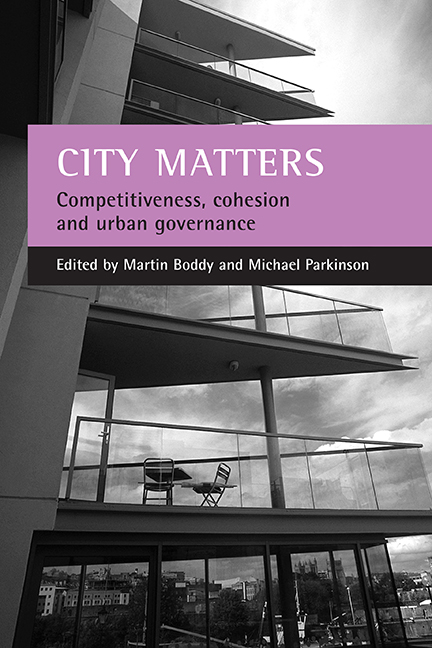Book contents
- Frontmatter
- Contents
- List of tables and figures
- Foreword
- Acknowledgements
- Notes on contributors
- one Introduction
- Part One Competitiveness, cohesion and urban governance
- Part Two Competitiveness and urban change
- Part Three Competitiveness, innovation and the knowledge economy
- Part Four Housing, property and economic performance
- Part Five Space, place and social cohesion
- Part Six Ethnicity, enterprise and social cohesion
- Part Seven Leadership, governance and social capital
- Conclusions
- Index
nineteen - Leadership and partnership in urban governance: evidence from London, Bristol and Glasgow
Published online by Cambridge University Press: 20 January 2022
- Frontmatter
- Contents
- List of tables and figures
- Foreword
- Acknowledgements
- Notes on contributors
- one Introduction
- Part One Competitiveness, cohesion and urban governance
- Part Two Competitiveness and urban change
- Part Three Competitiveness, innovation and the knowledge economy
- Part Four Housing, property and economic performance
- Part Five Space, place and social cohesion
- Part Six Ethnicity, enterprise and social cohesion
- Part Seven Leadership, governance and social capital
- Conclusions
- Index
Summary
A new leadership agenda has emerged in UK local governance. A community leadership role for local government has been articulated by central government and, following the Local Government Act 2000, new decision making structures have been introduced to support individual municipal leaders (Hambleton, 2000). In London, the first directly elected mayor in the UK was elected in 2000 to lead the Greater London Authority (GLA) (Sweeting, 2002). Beyond local government, community leaders are drawn into various partnerships, including those related to urban regeneration, creating a new generation of partnership leaders (Purdue et al, 2000). The Prime Minister himself has highlighted the importance of leadership at the local level (Blair, 1998), and the Local Government Association (LGA) has encouraged its members to adopt a much more outgoing approach to local leadership emphasising collaboration with other local stakeholders.
In a period that is witnessing a proliferation of urban partnerships and the emergence of a new elite of partnership leaders, the existing UK literature on leadership is lacking in several respects. In particular, UK research on local political leadership, while it has revealed insights into the relationships between party politics and the management of local authority bureaucracies, has tended to focus on the ‘internal world’ of the town hall (Leach and Wilson, 2000). Research on city leadership and elected mayors in other countries has focused on the relationship between the mayor and the council (Svara, 1990, 1994), or on the role of the chief executive (Klausen and Magnier, 1998). The relationship between the political leader and local governance is one that is only starting to be addressed (John and Cole, 1999; John, 2001). Research in the field of community development studies has examined ways of strengthening local participation in partnerships (Atkinson and Cope, 1997; Purdue et al, 1999), while issues relating to leadership have received less attention (Purdue et al, 2000), with little on the exercise of leadership in city-wide, multi-sector partnerships. Research in the field of management and organisational studies, while advancing understanding of the impact of organisational cultures on leadership within organisations, has neglected, with some exceptions (Bryson and Crosby, 1992; Chrislip and Larson, 1994), inter-organisational settings.
- Type
- Chapter
- Information
- City MattersCompetitiveness, Cohesion and Urban Governance, pp. 349 - 366Publisher: Bristol University PressPrint publication year: 2004



